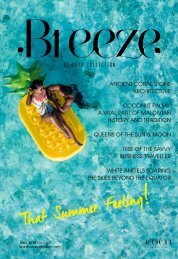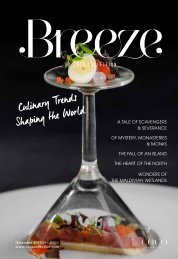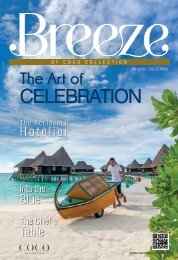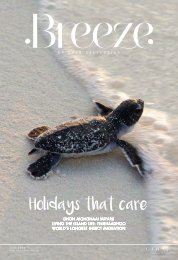Create successful ePaper yourself
Turn your PDF publications into a flip-book with our unique Google optimized e-Paper software.
MARINE BIOLOGY<br />
Chiara Fumagalli leads the marine<br />
biology team at Coco Collection<br />
Green turtles can be spotted<br />
while scuba diving throughout the<br />
Maldives<br />
disturbed. There are no lights on the beach so as not to<br />
disorientate the turtles and fences are erected around<br />
the nests, to protect them. Guests are invited to watch<br />
the incredible occurrence when a nest is laid and when<br />
they hatch – an unforgettable holiday memory – but<br />
Chiara ensures that no flash photography is used and<br />
that the guests stay a good distance away.<br />
At Dhuni Kolhu, Chiara often crosses paths<br />
with another breed of turtle; the olive ridley. Largely<br />
oceanic throughout the majority of their lives,<br />
unfortunately this breed comes on the radar<br />
only when it’s in trouble. “For a variety of reasons,<br />
including currents, our location and our dedicated<br />
team, we keep finding a high number of stranded ghost<br />
nets and injured olive ridley turtles,” says Chiara. Ghost<br />
nets, Chiara explains, are abandoned, dumped or lost<br />
fishing nets that drift throughout the ocean, often<br />
clumping together and trapping sea life as they go.<br />
Due to their oceanic habitats, olive ridleys are most at<br />
risk of getting entangled. Although fishing with nets<br />
is illegal in the Maldives, currents bring them to the<br />
islands, all the way from Sri Lanka, India and Pakistan.<br />
“If the turtles are badly injured, it’s often difficult<br />
to find them somewhere to recuperate,” Chiara says.<br />
“There’s only one turtle centre nearby and it’s always<br />
full to capacity.” Local NGO, Olive Ridley Project, was<br />
set up in 2012 to raise awareness of this issue and to<br />
track where the nets are coming from.<br />
With Dhuni Kolhu removing the highest number of<br />
ghost nets in the Maldives, Chiara knew that the resort<br />
could be part of the solution. “I kept thinking that there<br />
had to be something else we could do to help the<br />
turtles of the Maldives,” Chiara explains. With this in<br />
mind, the idea to build a turtle rehabilitation centre in<br />
partnership with the Olive Ridley Project was born.<br />
As soon as the idea came to her, Chiara drew up a<br />
proposal to present to the resort’s senior management.<br />
Turtles of all species are so inherent to the resort’s<br />
unique environmentally aware culture that they<br />
accepted it immediately. Within a few weeks, an<br />
agreement was signed with the NGO; Coco Palm Dhuni<br />
Kolhu would raise funds to build a turtle rehabilitation<br />
centre on site, whilst the Olive Ridley Project would<br />
provide guidance, support and general know-how.<br />
Currently, Coco Palm Dhuni Kolhu is raising funds to<br />
build the centre by adding an optional $10 surcharge<br />
to guests’ bills. In addition, they are selling colourful<br />
turtle soft toys, which have been crafted in Sri Lanka<br />
from gorgeous hand-woven fabrics. With the majority<br />
of guests choosing to donate in these ways, the centre<br />
is well on track and building work will commence<br />
before the year is out.<br />
With such extensive conservation efforts<br />
established in all Coco Collection resorts, and with the<br />
exciting prospect of a rehabilitation centre becoming<br />
a reality, Chiara’s belief that tourism holds the key<br />
to conservation is being proved right. With such an<br />
emphasis on nurturing sustainable, caring resorts, Coco<br />
endangered creatures with voice. As such, they are a<br />
part of the very core of these islands.<br />
www.cococollection.com<br />
41














